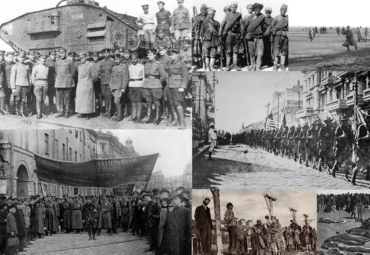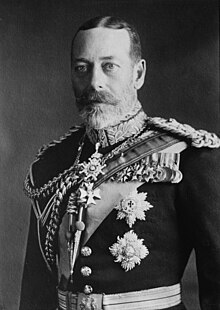1920s ' 20sTwenties ") was a decade that began on January 1, 1920, and ended on December 31, 1929. In America, it is frequently referred to as the "Roaring Twenties " or the "Jazz Age ", while in Europe the period is sometimes referred to as the "Golden Twenties " because of the economic boom following World War I (1914–1918). French speakers refer to the period as the "Années folles " ("crazy years"), emphasizing the era's social, artistic, and cultural dynamism.
Venezuela , which became the world's second-largest oil-producing nation. The devastating Wall Street Crash in October 1929 is generally viewed as a harbinger of the end of 1920s prosperity in North America and Europe. In the Soviet Union , the New Economic Policy was created by the Bolsheviks in 1921, to be replaced by the first five-year plan in 1928. The 1920s saw the rise of radical political movements, with the Red Army triumphing against White movement forces in the Russian Civil War , and the emergence of far-right political movements in Europe. In 1922, the fascist leader Benito Mussolini seized power in Italy . Other dictators that emerged included Józef Piłsudski in Poland , and Peter and Alexander Karađorđević in Yugoslavia . First-wave feminism made advances, with women gaining the right to vote in the United States (1920), Albania (1920), Ireland (1921), and with suffrage being expanded in Britain to all women over 21 years old (1928).
Turkish War of Independence , leading to the Treaty of Lausanne (1923), a treaty more favorable to Turkey than the earlier proposed Treaty of Sèvres . The war also led to the abolition of the Ottoman Caliphate . Nationalist revolts also occurred in Ireland (1919–1921) and Syria (1925–1927) . Under Mussolini, Italy pursued a more aggressive domestic and foreign policy, leading to the nigh-eradication of the Sicilian Mafia and the Second Italo-Senussi War in Libya respectively. In 1927, China erupted into a civil war between the Kuomintang (KMT)-led government of the Republic of China (ROC) and forces of the Chinese Communist Party (CCP). Civil wars also occurred in Paraguay (1922–1923) , Ireland (1922–1923) , Honduras (1924) , Nicaragua (1926–1927) , and Afghanistan (1928–1929) . Saudi forces conquered Jabal Shammar and subsequently, Hejaz .
famine occurred in Russia (1921–1922) due to the combined effects of economic disturbance because of the Russian Revolution and the Russian Civil War , exacerbated by rail systems that could not distribute food efficiently, leading to 5 million deaths. Another severe famine occurred in China (1928–1930), leading to 6 million deaths. The Spanish flu pandemic (1918–1920) and Russian typhus epidemic (1918–1922), which had begun in the previous decade, caused 25–50 million and 2–3 million deaths respectively. Major natural disasters of this decade include the 1920 Haiyuan earthquake (258,707~273,407 deaths), 1922 Shantou typhoon (50,000–100,000 deaths), 1923 Great Kantō earthquake (105,385–142,800 deaths), and 1927 Gulang earthquake (40,912 deaths).
Silent films were popular in this decade, with the highest-grossing film of this decade being either the American silent epic adventure -drama film Ben-Hur: A Tale of the Christ war drama film The Big Parade Sinclair Lewis was a popular author in the United States in the 1920s, with his books Main Street Elmer Gantry The Good Soldier Švejk Mack the Knife " and "Tiptoe Through the Tulips ".
During the 1920s, the world population increased from 1.87 to 2.05 billion, with approximately 700 million births and 525 million deaths in total. (Full article...
The Russian Civil War civil war in the former Russian Empire sparked by the overthrowing of the social-democratic Russian Provisional Government in the October Revolution , as many factions vied to determine Russia's political future. It resulted in the formation of the Russian Socialist Federative Soviet Republic and later the Soviet Union in most of its territory. Its finale marked the end of the Russian Revolution , which was one of the key events of the 20th century .
The
Russian monarchy ended with the abdication of Tsar
Nicholas II during the
February Revolution , and Russia was in a state of political flux. A tense summer culminated in the
October Revolution , where the
Bolsheviks overthrew the
provisional government of the new
Russian Republic . Bolshevik seizure of power was not universally accepted, and the country descended into civil war. The two largest combatants were the
Red Army , fighting for the establishment of a
Bolshevik-led socialist state headed by
Vladimir Lenin , and the loosely allied forces known as the
White Army , which functioned as a political
big tent for
right - and
left-wing opposition to Bolshevik rule. In addition, rival militant socialists, notably the
Ukrainian anarchists of the
Makhnovshchina and
Left Socialist-Revolutionaries , were involved in conflict against the Bolsheviks. They, as well as non-ideological
green armies , opposed the Bolsheviks, the Whites and the foreign interventionists. Thirteen foreign nations intervened against the Red Army, notably the
Allied intervention , whose primary goal was re-establishing the
Eastern Front of
World War I . Three foreign nations of the
Central Powers also intervened, rivaling the Allied intervention with the main goal of retaining the territory they had received in the
Treaty of Brest-Litovsk with Soviet Russia. (
Full article... )
List of selected articles
Zishe Breitbart Siegmund "Zishe" Breitbart Polish strongman and circus performer who was known as the "Strongest Man in the World" during the 1920s. He was widely popular in both Europe and the U.S., but died at the age of 32 after an accident during a performance.
George V King of the United Kingdom and the British Dominions , and Emperor of India , from 6 May 1910 until his death in 1936.
George was born during the reign of his paternal grandmother,
Queen Victoria , as the second son of the Prince and Princess of Wales (later
King Edward VII and
Queen Alexandra ). He was third in the line of
succession to the British throne behind his father and his elder brother,
Prince Albert Victor . From 1877 to 1892, George served in the
Royal Navy , until his elder brother's unexpected death in January 1892 put him directly in line for the throne. The next year,
George married his brother's fiancée,
Princess Victoria Mary of Teck , and they had six children. When
Queen Victoria died in 1901, George's father ascended the throne as Edward VII, and George was created
Prince of Wales . He became
king-emperor on
his father's death in 1910. (
Full article... )
List of selected biographies
You are invited to participate in WikiProject Years , a WikiProject dedicated to developing and improving articles about years, decades, centuries, and millennia.
Category puzzle Select to view subcategories
More Did you know (auto generated)
... that in the 1920s, Hickson Inc. Fifth Avenue ?
... that the serial arsonist who started the fatal Nihon Shōgakkō fire
... that in the 1920s, Australian journalist E. George Marks
... that the League for Human Rights
... that 1920s and 1930s radio show actress Artie Belle McGinty Aunt Jemima ?
... that 1920s actress Susie Sutton vaudeville troupe and toured her company throughout the TOBA circuit ?
The following are images from various 1920s-related articles on Wikipedia.
Image 1 The
Union of Soviet Socialist Republics (Soviet Union) is created in 1922. (from
1920s )
Image 3 George Grosz in 1921 (from
1920s )
Image 5 Prohibition agents emptying barrels of alcohol. (from
1920s )
Image 6 Dow Jones Industrial , 1928–1930 (from
1920s )
Image 7 Crowd gathering after the
Wall Street Crash of 1929 (from
1920s )
Image 9 Spanish troops in
San Sebastián , prior to their departure to the
Rif War . (from
1920s )
Image 10 The period from the end of the First World War until the start of the Depression in 1929 is known as the "
Jazz Age " (from
1920s )
Image 11 D. W. Griffith at a rolltop desk, c. 1925 (from
1920s )
Image 12 1920s phone (from
1920s )
Image 13 Thompson submachine gun (1921 model) (from
1920s )
Image 14 Albert Einstein , 1921 (from
1920s )
Image 15 From left, clockwise:
Third Tipperary Brigade Flying Column No. 2 under
Seán Hogan during the
Irish War of Independence ; Prohibition agents destroying barrels of alcohol in accordance to the
18th amendment , which made
alcoholic beverages illegal in the United States throughout the entire decade; In 1927, Charles Lindbergh embarks on the first solo nonstop flight from New York to Paris on the
Spirit of St. Louis ; A crowd gathering on
Wall Street after the
1929 stock market crash , which led to the
Great Depression ;
Benito Mussolini and
fascist Blackshirts during the
March on Rome in 1922; the
People's Liberation Army attacking government defensive positions in
Shandong , during the
Chinese Civil War ; The
women's suffrage campaign leads to
numerous countries granting women the
right to vote and be elected;
Babe Ruth becomes the most famous baseball player of the time. (from
1920s )
Image 17 Adolf Hitler (standing) delivers a speech in February 1925 (from
1920s )
Image 18 Babe Ruth in 1920 (from
1920s )
Image 20 Buster Keaton in the 1922 short film
The Frozen North (from
1920s )
Image 21 2 out of 10 best-selling American books in the 1920s were written by
Sinclair Lewis (1885–1951) (from
1920s )
Image 22 Robert Goddard and his rocket, 1926 (from
1920s )
Image 23 Charlie Chaplin during the 1920s (from
1920s )
Image 24 The most memorable fashion trend of the Roaring Twenties was undoubtedly "the
flapper " look. (from
1920s )
Image 25 Map of the world from 1920, two years after World War I (from
1920s )
Image 26 Irving Berlin (left) and
Al Jolson ,
c. 1927 (from
1920s )
Image 27 Georgia O'Keeffe in 1920, photographed by
Alfred Stieglitz (from
1920s )





















































